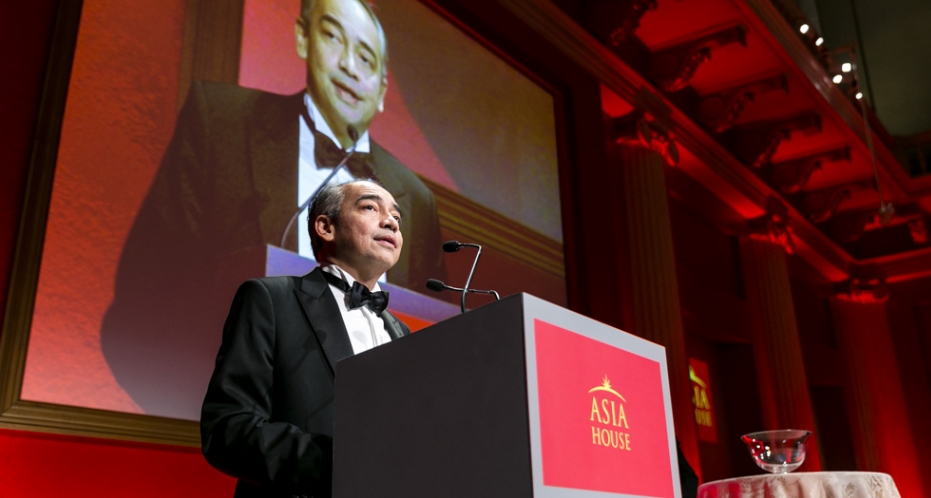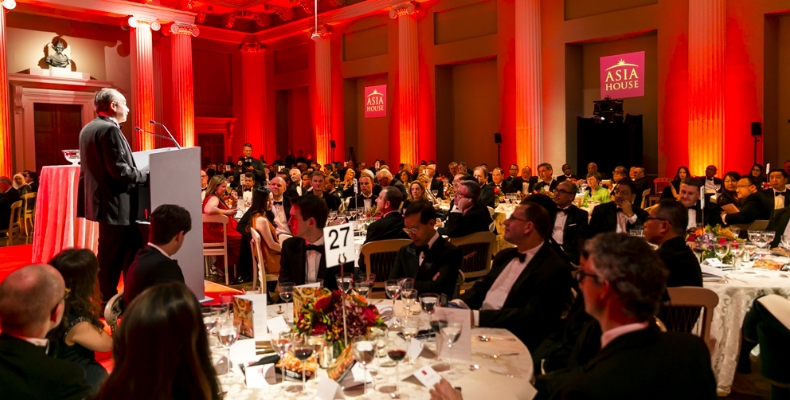Driving commercial and political engagement between Asia, the Middle East and Europe
Driving commercial and political engagement between Asia, the Middle East and Europe
Driving commercial and political engagement between Asia, the Middle East and Europe

CIMB Group Chairman Nazir Razak said that despite 2015 being an “annus horribilis” for emerging markets he was motivated by winning the 2015 Asian Business Leaders Award to continue his quest to accelerate ASEAN economic integration and bring about much-needed change in Malaysia’s political-economy.
“It’s been really hard trying to be an integrated ASEAN company while economic integrators battle legacies, bureaucracies and domestic priorities. If that wasn’t enough, post-2008, regulators turned much more cautious about cross-border banking,” he said, in his acceptance speech of the Asian Business Leaders Award at Banqueting House at a gala dinner attended by more than 250 political and business figures, which included VIPs from across Asia and the UK.
“Since 2007 CIMB has aligned itself with ASEAN when our governments launched the ASEAN Charter,” he said.
“We expanded aggressively cross the region to create a banking platform that would best serve the needs of multinationals, companies and individuals that operate or just move around the region,” he added.
“We fully embraced the ASEAN Economic Community (AEC) – the promise of a single production base with free movement of goods and services and skilled labour by the end of 2015.” he said. “We have developed our business model to benefit from the expected greater flows of businesses across borders and the promised ease of operating in different markets,” he explained.
“When I was informed of this Award late last year, I remember thinking ‘Yet another reason to look forward to 2015.’ Indeed 2015 was meant to be the year for the region and for Malaysia, as the chairman of ASEAN in the year it becomes a community,” he said.
“And for companies like CIMB, 2015 was supposed to be all about positioning for the AEC and all the new opportunities it would bring,” he added.
“The AEC is a beautiful idea and it is also a necessity to realise the economies of scale of a market of 650 million and all the cross-border synergies that diverse ASEAN promises,” he said.
But 2015 was now set to be an “annus horribilis” for emerging markets “of a scale not seen since the Asian Financial Crisis,” he said.
Several of the hitherto fast-growing economies in ASEAN have seen their economies slow down and their currencies plummet this year, hit by a combination of global slowdown and sluggish growth in China as well as a sharp fall in commodity prices, weak domestic consumer demand and internal political problems. Moreover by the end of 2015, ASEAN will fall short of the target of the AEC as articulated in the original 2007 ASEAN charter. The AEC project will continue to tackle non-tariff barriers and implement other initiatives to enhance trade and business flows for several more years before it looks anything like what was originally envisaged.
“Our governments have been distracted, and ASEAN somewhat neglected,” Mr Razak told the audience.
“Most ASEAN economies have been hit hard, but Malaysia has probably been the hardest hit because of its heavy reliance on oil and other commodities, lack of government fiscal space, and the most bizarre development on the political front,” he said.
Allegations were made in various newspapers this year that US$700m (£455 million) from the strategic development company 1MDB (1Malaysia Development Berhad), owned by the Government of Malaysia, had ended up in his brother the Malaysia Prime Minister Datuk Seri Najib Tun Razak’s bank account. These allegations led to street protests.

Nazir Razak gave a speech to an audience of more than 250 political and business figures. Photo by Miles Willis
The Malaysian prime minister has denied taking any money from 1MDB for personal gain.
But Nazir Razak said the ASEAN project should not be judged by what happens in 2015. He said ASEAN had weathered many storms and the AEC had seen a “multitude of achievements” which included the almost complete reduction in tariffs, the proliferation of ASEAN multinationals and the “now irreversible momentum of economic integration that has built up.”
He said that CIMB and all banks in the region would be challenged by the economic headwinds impacting markets and borrowers but CIMB and the all major ASEAN banks had all baulked up since the Asian Financial Crisis and would all prove resilient.
He then gave examples of businesses CIMB had come across that had directly benefited from ASEAN.
He mentioned an Indonesian scarf maker who was earning US$400 a month. Thanks to e-commerce and ASEAN, her earnings have now shot up to US$10,000 per month. “New companies like GrabTaxi and Happy Fresh have expanded rapidly across ASEAN when unrestrained by old economy non tariff barriers,” he said. And he pointed out that even in the face of lots of non tariff barriers there had been a proliferation of ASEAN multinationals such as AirAsia, Ayala Corporation and Axiata.
He added many ASEAN businesses were working together in third countries such as the UK and that the Battersea Power Station redevelopment was supported by Malaysian and Singaporean banks.

Guests at the Asian Business Leaders Award Dinner held at Banqueting House in London on 13 October. Photo by Andy Tyler
Mr Razak then reiterated what he had previously said in an exclusive interview with Asia House, that he would like to see the establishment of a National Consultative Council (NCC) set up modelled after the NCC in 1970, where a broad spectrum of Malaysian political parties, businesses and NGOs formulated a new way forward for Malaysia.
This would be in response “not just to the current political and socio-economic situation” but also because of the realities of the ‘new world economic order,’ he explained.
The Malaysian political-economy was currently based on a 1970s design that involved “affirmative action, heavy government presence in business, superior vernacular versus national schools,” he said.
He said this political-economy would not “cope “with the demands of the new economy which requires Malaysia to attract and retain the most talented individuals, enable and encourage creative disruption versus vested interest and spur innovation by unleashing creativity and entrepreneurship.
He ended his speech offering solutions to the various problems of the region, saying the Award had motivated him to continue to bring about change.
“Malaysia has been a great success story among emerging countries and it has great potential as the best gateway to ASEAN,” he said.
“I intend to view this Award as further motivation for my future and as an agent for these changes that I have talked about. The AEC needs the ASEAN Business Club and other private sector to volunteer to help accelerate the pace of integration and Malaysia needs national, social, political and economic recalibration,” he concluded.
naomi.canton@asiahouse.co.uk
To read an exclusive interview Nazir Razak gave Asia House about ASEAN integration click here.
To read an exclusive interview Nazir Razak gave Asia House about how to get the Malaysian economy back on track click here.
To read more about the Asian Business Leaders Award Dinner click here.
